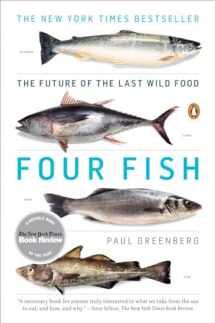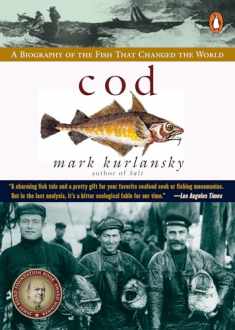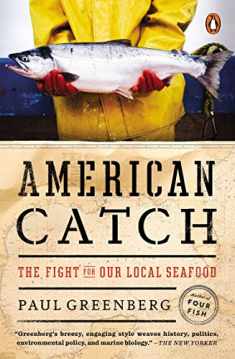
Four Fish: The Future of the Last Wild Food
ISBN-13:
9780143119463
ISBN-10:
014311946X
Edition:
Reprint
Author:
Paul Greenberg
Publication date:
2011
Publisher:
Penguin Books
Format:
Paperback
285 pages
FREE US shipping
on ALL non-marketplace orders
Marketplace
from $16.35
USD
Marketplace offers
Seller
Condition
Note
Seller
Condition
New
Brand New! Not overstocks! Brand New direct from the publisher! Ships in sturdy cardboard packaging.
Book details
ISBN-13:
9780143119463
ISBN-10:
014311946X
Edition:
Reprint
Author:
Paul Greenberg
Publication date:
2011
Publisher:
Penguin Books
Format:
Paperback
285 pages
Summary
Four Fish: The Future of the Last Wild Food (ISBN-13: 9780143119463 and ISBN-10: 014311946X), written by authors
Paul Greenberg, was published by Penguin Books in 2011.
With an overall rating of 4.3 stars, it's a notable title among other
Environmental Economics
(Economics, Engineering, Food Science, Agricultural Sciences, Sustainable Agriculture, Conservation, Nature & Ecology) books. You can easily purchase or rent Four Fish: The Future of the Last Wild Food (Paperback) from BooksRun,
along with many other new and used
Environmental Economics
books
and textbooks.
And, if you're looking to sell your copy, our current buyback offer is $0.43.
Description
"A necessary book for anyone truly interested in what we take from the sea to eat, and how, and why." —Sam Sifton, The New York Times Book Review.
Acclaimed author of American Catch and The Omega Princple and life-long fisherman, Paul Greenberg takes us on a journey, examining the four fish that dominate our menus: salmon, sea bass, cod, and tuna.
Investigating the forces that get fish to our dinner tables, Greenberg reveals our damaged relationship with the ocean and its inhabitants. Just three decades ago, nearly everything we ate from the sea was wild. Today, rampant overfishing and an unprecedented biotech revolution have brought us to a point where wild and farmed fish occupy equal parts of a complex marketplace.
Four Fish offers a way for us to move toward a future in which healthy and sustainable seafood is the rule rather than the exception.
Acclaimed author of American Catch and The Omega Princple and life-long fisherman, Paul Greenberg takes us on a journey, examining the four fish that dominate our menus: salmon, sea bass, cod, and tuna.
Investigating the forces that get fish to our dinner tables, Greenberg reveals our damaged relationship with the ocean and its inhabitants. Just three decades ago, nearly everything we ate from the sea was wild. Today, rampant overfishing and an unprecedented biotech revolution have brought us to a point where wild and farmed fish occupy equal parts of a complex marketplace.
Four Fish offers a way for us to move toward a future in which healthy and sustainable seafood is the rule rather than the exception.


We would LOVE it if you could help us and other readers by reviewing the book
Book review

Congratulations! We have received your book review.
{user}
{createdAt}
by {truncated_author}




